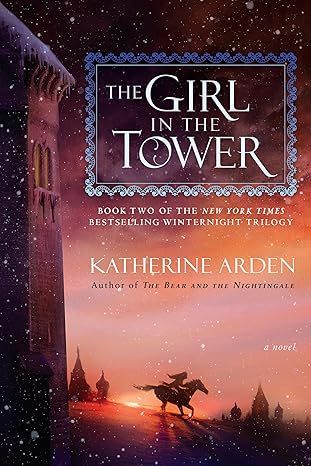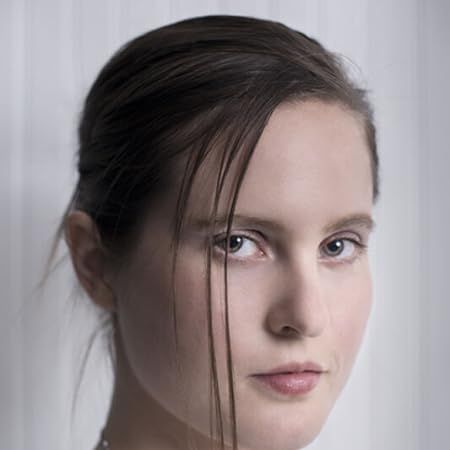The Girl in the Tower: A Novel (Winternight Trilogy)Paperback
4.6
-
9,947 ratings
A remarkable young woman blazes her own trail, from the backwoods of Russia to the court of Moscow, in the exhilarating sequel to Katherine Arden’s bestselling debut novel, The Bear and the Nightingale.
Katherine Arden’s enchanting first novel introduced readers to an irresistible heroine. Vasilisa has grown up at the edge of a Russian wilderness, where snowdrifts reach the eaves of her family’s wooden house and there is truth in the fairy tales told around the fire. Vasilisa’s gift for seeing what others do not won her the attention of Morozko—Frost, the winter demon from the stories—and together they saved her people from destruction. But Frost’s aid comes at a cost, and her people have condemned her as a witch.
Now Vasilisa faces an impossible choice. Driven from her home by frightened villagers, the only options left for her are marriage or the convent. She cannot bring herself to accept either fate and instead chooses adventure, dressing herself as a boy and setting off astride her magnificent stallion Solovey.
But after Vasilisa prevails in a skirmish with bandits, everything changes. The Grand Prince of Moscow anoints her a hero for her exploits, and she is reunited with her beloved sister and brother, who are now part of the Grand Prince’s inner circle. She dares not reveal to the court that she is a girl, for if her deception were discovered it would have terrible consequences for herself and her family. Before she can untangle herself from Moscow’s intrigues—and as Frost provides counsel that may or may not be trustworthy—she will also confront an even graver threat lying in wait for all of Moscow itself.
Praise for The Girl in the Tower
“[A] magical story set in an alluring Russia.”—Paste
“Arden’s lush, lyrical writing cultivates an intoxicating, visceral atmosphere, and her marvelous sense of pacing carries the novel along at a propulsive clip. A masterfully told story of folklore, history, and magic with a spellbinding heroine at the heart of it all.”—Booklist (starred review)
“[A] sensual, beautifully written, and emotionally stirring fantasy . . . Fairy tales don’t get better than this.”—Publishers Weekly (starred review)
“[Katherine] Arden once again delivers an engaging fantasy that mixes Russian folklore and history with delightful worldbuilding and lively characters.”—Library Journal
Read more
Kindle
$12.99
Available instantly
Audiobook
$0.00
with membership trial
Hardcover
$19.69
Paperback
$14.49
Ships from
Amazon.com
Payment
Secure transaction
ISBN-10
110188598X
ISBN-13
978-1101885987
Print length
400 pages
Language
English
Publisher
Del Rey
Publication date
June 25, 2018
Dimensions
5.53 x 0.82 x 8.25 inches
Item weight
11.2 ounces
Frequently bought together
Popular Highlights in this book
Witch. The word drifted across his mind. We call such women so, because we have no other name.
Highlighted by 1,092 Kindle readers
To small minds, she told him, spine very straight, any skill must look like sorcery.
Highlighted by 911 Kindle readers
I did not know I was lonely, she thought, until I was no longer alone.
Highlighted by 770 Kindle readers
Product details
ASIN :
B06X3TL4YD
File size :
6324 KB
Text-to-speech :
Enabled
Screen reader :
Supported
Enhanced typesetting :
Enabled
X-Ray :
Enabled
Word wise :
Enabled
Editorial Reviews
Advance praise for The Girl in the Tower
“Arden’s lush, lyrical writing cultivates an intoxicating, visceral atmosphere, and her marvelous sense of pacing carries the novel along at a propulsive clip. A masterfully told story of folklore, history, and magic with a spellbinding heroine at the heart of it all.”—Booklist (starred review)
“[A] sensual, beautifully written, and emotionally stirring fantasy . . . Fairy tales don’t get better than this.”—Publishers Weekly (starred review)
Praise for Katherine Arden’s The Bear and the Nightingale
“Arden’s debut novel has the cadence of a beautiful fairy tale but is darker and more lyrical.”—The Washington Post
“A beautiful deep-winter story, full of magic and monsters and the sharp edges of growing up.”—Naomi Novik, bestselling author of Uprooted
“Stunning . . . will enchant readers from the first page . . . with an irresistible heroine who wants only to be free of the bonds placed on her gender and claim her own fate.”—Publishers Weekly (starred review)
“Vasya [is] a clever, stalwart girl determined to forge her own path in a time when women had few choices.”—The Christian Science Monitor
“Utterly bewitching . . . an immersive, earthy story of folk magic, faith, and hubris, peopled with vivid, dynamic characters.”—Booklist (starred review)
Sample
1
The Death of the Snow-Maiden
Moscow, just past midwinter, and the haze of ten thousand fires rose to meet a smothering sky. To the west a little light lingered, but in the east the clouds mounded up, bruise-colored in the livid dusk, buckling with unfallen snow.
Two rivers gashed the skin of the Russian forest, and Moscow lay at their joining, atop a pine-clad hill. Her squat, white walls enclosed a jumble of hovels and churches; her palaces’ ice-streaked towers splayed like desperate fingers against the sky. As the daylight faded, lights kindled in the towers’ high windows.
A woman, magnificently dressed, stood at one of these windows, watching the firelight mingle with the stormy dusk. Behind her, two other women sat beside an oven, sewing.
“That is the third time Olga has gone to the window this hour,” whispered one of the women. Her ringed hands flashed in the dim light; her dazzling headdress drew the eye from boils on her nose.
Waiting-women clustered nearby, nodding like blossoms. Slaves stood near the chilly walls, their lank hair wrapped in kerchiefs.
“Well, of course, Darinka!” returned the second woman. “She is waiting for her brother, the madcap monk. How long has it been since Brother Aleksandr left for Sarai? My husband has been waiting for him since the first snow. Now poor Olga is pining at her window. Well, good luck to her. Brother Aleksandr is probably dead in a snowbank.” The speaker was Eudokhia Dmitreeva, Grand Princess of Moscow. Her robe was sewn with gems; her rosebud mouth concealed the stumps of three blackened teeth. She raised her voice shrilly. “You will kill yourself standing in this wind, Olya. If Brother Aleksandr were coming, he would have been here by now.”
“As you say,” Olga replied coolly from the window. “I am glad you are here to teach me patience. Perhaps my daughter will learn from you how a princess behaves.”
Eudokhia’s lips thinned. She had no children. Olga had two, and was expecting a third before Easter.
“What is that?” said Darinka suddenly. “I heard a noise. Did you hear that?”
Outside, the storm was rising. “It was the wind,” said Eudokhia. “Only the wind. What a fool you are, Darinka.” But she shivered. “Olga, send for more wine; it is cold in this drafty room.”
In truth, the workroom was warm—windowless, save for the single slit—heated with a stove and many bodies. But—“Very well,” said Olga. She nodded at her servant, and the woman went out, down the steps into the freezing night.
“I hate nights like this,” said Darinka. She clutched her robe about her and scratched a scab on her nose. Her eyes darted from candle to shadow and back. “She comes on nights like this.”
“She?” asked Eudokhia sourly. “Who is she?”
“Who is she?” repeated Darinka. “You mean you don’t know?” Darinka looked superior. “She is the ghost.”
Olga’s two children, who had been arguing beside the oven, stopped screeching. Eudokhia sniffed. From her place by the window, Olga frowned.
“There is no ghost,” Eudokhia said. She reached for a plum preserved in honey, bit and chewed daintily, then licked the sweetness from her fingers. Her tone implied that this palace was not quite worthy of a ghost.
“I have seen her!” protested Darinka, stung. “Last time I slept here, I saw her.”
Highborn women, who must live and die in towers, were much given to visiting. Now and again, they stayed overnight for company, when their husbands were away. Olga’s palace—clean, orderly, prosperous—was a favorite; the more so as Olga was eight months gone with child and did not go out.
Hearing, Olga frowned, but Darinka, eager for attention, hurried on. “It was just after midnight. Some days ago. A little before Midwinter.” She leaned forward, and her headdress tipped precariously. “I was awakened—I cannot remember what awakened me. A noise . . .”
Olga made the faintest sound of derision. Darinka scowled. “I cannot remember,” she repeated. “I awakened and all was still. Cold moonlight seeped around the shutters. I thought I heard something in the corner. A rat, perhaps, scritching.” Darinka’s voice dropped. “I lay still, with the blankets drawn about me. But I could not fall asleep. Then I heard someone whimper. I opened my eyes and shook Nastka, who slept next to me. ‘Nastka,’ I told her, ‘Nastka, light a lamp. Someone is crying.’ But Nastka did not stir.”
Darinka paused. The room had fallen silent.
“Then,” Darinka went on, “I saw a gleam of light. It was an unchristian glow, colder than moonlight, nothing like good firelight. This glow came nearer and nearer . . .”
Darinka paused again. “And then I saw her,” she finished in a hushed voice.
“Her? Who? What did she look like?” cried a dozen voices.
“White as bone,” Darinka whispered. “Mouth fallen in, eyes dark pits to swallow the world. She stared at me, lipless as she was, and I tried to scream but I could not.”
One of the listeners squealed; others were clutching hands.
“Enough,” snapped Olga, turning from her place by the window. The word cut through their half-serious hysteria, and the women fell uneasily silent. Olga added, “You are frightening my children.”
This was not entirely true. The elder, Marya, sat upright and blazing-eyed. But Olga’s boy, Daniil, clutched his sister, quivering.
“And then she disappeared,” Darinka finished, trying for nonchalance and failing. “I said my prayers and went back to sleep.”
She lifted her wine-cup to her lips. The two children stared.
“A good story,” Olga said, with a very fine edge on her voice. “But it is done now. Let us tell other tales.”
She went to her place by the oven and sat. The firelight played on her double-plaited hair. Outside, the snow was falling fast. Olga did not look toward the window again, though her shoulders stiffened when the slaves closed the shutters.
More logs were heaped on the fire; the room warmed and filled with a mellow glow.
“Will you tell a tale, Mother?” cried Olga’s daughter, Marya. “Will you tell a story of magic?”
A muffled sound of approval stirred the room. Eudokhia glared. Olga smiled. Though she was the Princess of Serpukhov, Olga had grown up far from Moscow, at the edge of the haunted wilderness. She told strange stories from the north. Highborn women, who lived their lives between chapel and bakehouse and tower, treasured the novelty.
The princess considered her audience. Whatever grief she had felt standing alone by the window was now quite absent from her expression. The waiting-women put down their needles and curled up eagerly on their cushions.
Outside, the hiss of the wind mixed with the silence of the snowstorm that is itself a noise. With a flurry of shouting below, the last of the stock was driven into barns, to shelter from the frost. From the snow-filled alleys, beggars crept into the naves of churches, praying to live until morning. The men on the kremlin-wall huddled near their braziers and drew their caps around their ears. But the princess’s tower was warm and filled with expectant silence.
“Listen, then,” Olga said, feeling out the words.
“In a certain princedom there lived a woodcutter and his wife, in a little village in a great forest. The husband was called Misha, his wife Alena, and they were very sad. For though they had prayed diligently, and kissed the icons and pleaded, God did not see fit to bless them with a child. Times were hard and they had no good child to help them through a bitter winter.”
Olga put a hand to her belly. Her third child—the nameless stranger—kicked in her womb.
“One morning, after a heavy snow, husband and wife went into the forest to chop firewood. As they chopped and stacked, they pushed the snow into heaps, and Alena, idly, began to fashion the snow into a pale maiden.”
“Was she as pretty as me?” Marya interrupted.
Eudokhia snorted. “She was a snow-maiden, fool. All cold and stiff and white. But”—Eudokhia eyed the little girl—“she was certainly prettier than you.”
Marya reddened and opened her mouth.
“Well,” Olga hurriedly continued, “the snow-girl was white, it is true, and stiff. But she was also tall and slender. She had a sweet mouth and a long braid, for Alena had sculpted her with all her love for the child she could not have.
“ ‘See, wife?’ said Misha, observing the little snow-maiden. ‘You have made us a daughter after all. There is our Snegurochka, the snow-maiden.’
“Alena smiled, though her eyes filled with tears.
“Just then an icy breeze rattled the bare branches, for Morozko the frost-demon was there, watching the couple and their snow-child.
“Some say that Morozko took pity on the woman. Others say that there was magic in the woman’s tears, weeping on the snow-maiden when her husband could not see. But either way, just as Misha and Alena turned for home, the snow-maiden’s face grew flushed and rosy, her eyes dark and deep, and then a living girl stood in the snow, birth-naked, and smiled at the old couple.
“ ‘I have come to be your daughter,’ she said. ‘If you will have me, I will care for you as my own father and mother.’
“The old couple stared, first in disbelief, then joy. Alena hurried forward, weeping, took the maiden by her cold hand, and led her toward the izba.
“The days passed in peace. Snegurochka swept the floor and cooked their meals and sang. Sometimes her songs were strange and made her parents uneasy. But she was kind and deft in her work. When she smiled, it always seemed the sun shone. Misha and Alena could not believe their luck.
“The moon waxed and waned, and then it was midwinter. The village came alive with scents and sounds: bells on sledges and flat golden cakes.
“Now and again, folk passed Misha and Alena’s izba on their way to or from the village. The snow-maiden watched them, hidden behind the woodpile.
“One day a girl and a tall boy passed Snegurochka’s hiding place, walking hand in hand. They smiled at each other, and the snow-maiden was puzzled by the joy-like flame in their two faces.
“The more she thought of it, the less she understood, but Snegurochka could not stop thinking of that look. Where before she was content, now she grew restless. She paced the izba and made cold trails in the snow beneath the trees.
“Spring was not far off on the day Snegurochka heard a beautiful music in the forest. A shepherd-boy was playing his pipe.
“Snegurochka crept near, fascinated, and the shepherd saw the pale girl. When she smiled, the boy’s warm heart leaped out to her cold one.
“The weeks passed, and the shepherd fell in love. The snow softened; the sky was a clear mild blue. But still the snow-maiden fretted.
“ ‘You are made of snow,’ Morozko the frost-demon warned her, when she met him in the forest. ‘You cannot love and be immortal.’ As the winter waned, the frost-demon grew fainter, until he was only visible in the deepest shade of the wood. Men thought he was a breeze in the holly-bushes. ‘You were born of winter and you will live forever. But if you touch the fire you will die.’
“But the shepherd-boy’s love had made the maiden a little scornful. ‘Why should I be always cold?’ she retorted. ‘You are an old cold thing, but I am a mortal girl now; I will learn about this new thing, this fire.’
“ ‘Better to stay in the shade,’ was the only reply.
“Spring drew nearer. Folk left their homes more often, to gather green things in hidden places. Again and again the shepherd came to Snegurochka’s izba. ‘Come into the wood,’ he would say.
“She would leave the shadows beside the oven to go out and dance in the shade. But though Snegurochka danced, her heart was still cold at its core.
“The snow began to melt in earnest; the snow-maiden grew pale and weak. She went weeping into the darkest part of the forest. ‘Please,’ she said. ‘I would feel as men and women feel. I beg you to grant me this.’
“ ‘Ask Spring, then,’ replied the frost-demon reluctantly. The lengthening days had faded him; he was more breeze than voice. The wind brushed the snow-child’s cheek with a sorrowful finger.
“Spring is like a maiden, old and eternally young. Her strong limbs were twined with flowers. ‘I can give you what you seek,’ said Spring. ‘But you will surely die.’
“Snegurochka said nothing and went home weeping. For weeks she stayed in the izba, hiding in the shadows.
“But the young shepherd went and tapped on her door. ‘Please, my love,’ he said. ‘Come out to me. I love you with all my heart.’
“Snegurochka knew that she could live forever if she chose, a snow-girl in a little peasant’s izba. But . . . there was the music. And her lover’s eyes.
“So she smiled and clothed herself in blue and white. She ran outside. Where the sun touched her, drops of water slid from her flaxen hair.
“She and the shepherd went to the edge of the birch-wood.
“ ‘Play your flute for me,’ she said.
“The water ran faster, down her arms and hands, down her hair. Though her face was pale, her blood was warm, and her heart. The young man played his flute, and Snegurochka loved him, and she wept.
“The song ended. The shepherd went to take her into his arms. But as he reached for her, her feet melted. She crumpled to the damp earth and vanished. An icy mist drifted under the warmth of the blue sky, and the boy was left alone.
“When the snow-maiden vanished, Spring swept her veil over the land, and the little field flowers began to bloom. But the shepherd waited in the gloom of the wood, weeping for his lost love.
“Misha and Alena wept as well. ‘It was only a magic,’ said Misha to comfort his wife. ‘It could not last, for she was made of snow.’ ”
Read more
About the authors
Katherine Arden
Born in Austin, Texas, Katherine Arden spent her junior year of high school in Rennes, France.
Following her acceptance to Middlebury College in Vermont, she deferred enrolment for a year in order to live and study in Moscow. At Middlebury, she specialized in French and Russian literature.
After receiving her BA, she moved to Maui, Hawaii, working every kind of odd job imaginable, from grant writing and making crêpes to serving as a personal tour guide. After a year on the island, she moved to Briançon, France, and spent nine months teaching. She then returned to Maui, stayed for nearly a year, then left again to wander. Currently she lives in Vermont, but really, you never know.
She is the author of The Bear and the Nightingale.
Read more
Reviews
Customer reviews
4.6 out of 5
9,947 global ratings
Buffalocolt27
5
As good as the first one!
Reviewed in the United States on June 25, 2024
Verified Purchase
Love these characters who are strong, but human also. Excellent and beautiful prose puts you in the story. Couldn't put it down!
Byron
5
A terrific winter fairy tale
Reviewed in the United States on January 6, 2018
Verified Purchase
Last winter, I read The Bear and the Nightingale by Katherine Arden, a lyrical novel-length fairy tale set in medieval Russia. With its chilling descriptions of harsh cold and deep Russian winters, it was a perfect thing to read on freezing January nights. The Girl in the Tower continues the story of Bear’s protagonist, Vasya. There is no sophomore slump or middle-book problem here; I loved this book as much as I loved the first. The author retains the lyrical style present in the first book, but does not simply repeat its plot or main conflict, instead presenting a new, tense situation for Vasya to navigate.
Western fairy tales typically involve a beautiful maiden of humble origins marrying a handsome prince and living happily ever after. In medieval Russia, that is the goal of every Russian lady: to marry well and make babies. If marriage is not agreeable, they are resigned to a life in a convent.
Vasya, however, has no interest in becoming some man’s broodmare and being locked away in a castle or convent for the rest of her life. The Girl in the Tower is largely about Vasya’s struggle for freedom against the gender restrictions of her time. But with pagan spirits, witches, sorcery, ghosts, a frost demon psychopomp, and a really cool horsey.
You don’t have to be a hardcore fantasy fan to appreciate this series. It’s got plenty of stuff for fans of more general historical fiction: (1) a young girl fighting against the (very) limited roles for females in this medieval society (2) rural pagan beliefs against the spreading influence of Christianity (3) and a more-or-less accurate picture of medieval Russian culture. If those sorts of things interest you and you can tolerate some supernatural elements, you might enjoy this novel.
You do not HAVE to read Bear and the Nightingale before you read this, but I highly recommend it. It is not like The Lord of the Rings Trilogy which is one big story split up into 3 books. Each of the books in this series has a clearly defined, independent conflict and resolution. However, a lot of the worldbuilding and characters are introduced in Bear, so readers may be a bit lost if they just dive into this book without reading Bear first. I would liken it to trying to watch The Empire Strikes Back without first seeing A New Hope.
If you read Bear but did not care for it, I would still recommend that you give this book a try. Vasya is a little older, the conflicts are a little different, and Arden has matured a little bit as a writer. Fans of Mulan should definitely give this book a try as it is basically…well…Mulan. Kinda.
Although I refer to this book as a fairy tale, I should make it clear that it’s for mature audiences. There is violence, sexual violence, threats of sexual violence, and other things that are not really suited for young kids.
Read more
3 people found this helpful
Josh Mauthe
5
Every bit as good as the first - just as magical, exciting, evocative, immersive, rich, and just plain wondrous
Reviewed in the United States on January 9, 2018
Verified Purchase
Sometimes, there's little more intimidating than approaching the second book of a series you loved. What if it doesn't live up to the first? What if it retroactively goes back and changes things you liked, or moves away from what made the first book great? Worst of all, what if it just leaves you disappointed? And so, yes, I was a little nervous about The Girl in the Tower, Katherine Arden's followup to the incredible The Bear and the Nightingale. That was a book I truly loved, and one whose scope remained intimate and character-based, even as the story got more complex, the mythology richer, and the imagination wider - and between "fantasy series bloat" and "middle book syndrome," there was plenty that could go wrong.
And somehow, not a bit of it did, because instead, I got a book that I loved every bit as much as its predecessor, and left me every bit as excited and enthralled by this series as the first one did.
Like its predecessor, The Girl in the Tower is a book about medieval Russia - a country that's not yet a country, on the verge of historic change. It's a population that is slowly letting go of its folklore and heritage, moving towards Christianity, but also towards independence. But the Khans are still in charge, and more pressingly, there are horrific bandit attacks happening throughout the cities, where populations are slaughtered and girls are kidnapped - and the bandits disappear without a trace.
While The Bear and the Nightingale focused on life in the wildernesses of the time, The Girl in the Tower dives into the world of medieval Moscow, with court politics, royal unease, power struggles, and the Church all pushing against each other and interweaving in complex ways. Yes, Vasya Petronova is still here, clinging to folklore and the creatures of magic that are being forced to the side in the face of a changing country; but this time, Arden brings back two members of her family that we barely got to know in Nightingale - her devoted monk brother Sasha, and her married-into-royalty elder sister Olga. What their part is in this story is - as well as how the Crown Prince and a mysterious lord come into play - should best be discovered by the reader. Suffice to say, once again, Arden mixes magic, history, character building, and imagination into something incredible, spinning a story that remains true to its characters while dazzling with its inventions, which dives into Russian folktales and fairy tales while immersing itself in history, and all around dazzling me on every page.
More importantly, Arden's characters continue to grow over the books, turning their relationships into an equally important part of the series, from a complex romance that shouldn't exist to family relationships strained by different values. The book allows these to be as equally - or more - important as the plotting of the book, investing us just as much in the love of a family member as we are in the truth of these mysterious bandits. It even further complicates our feelings on a returning villain, who continues his shift from hateful zealot into something more tragic, even as his cruelty continues. And if that's not enough, there's the rich subtext of the book, as a country tries to reconcile its past and its future, even when those things are incompatible.
Somehow, Arden does all of this while making her story exciting, inventive, and thrilling; even more impressive, she both sets up a final entry in the series and once again delivers a self-contained story that satisfies on its own terms, not just as setup for an eventual payoff. In other words, it's a piece of a larger whole, but a piece that can be appreciated on its own - and that's something we don't do often enough. Yes, the payoffs are more effective if you've read the first book - there is a final moment between two characters that broke my heart, even as I suspect there's more to come - but more importantly, I can spend the next few months waiting on book 3 satisfied with what I have, even though I'm ready for more.
And in the meantime, maybe you should read these books. If you love the way Neil Gaiman uses fairy tales to explore larger themes; if you love books about historical fiction with a focus on folklore and belief; if you're fascinated by Russian tales of heroes and demons and ghosts; if you love fantasy about women who want to be more than their gender should allow; if you're fascinated by the boundary between religion and myth; or if you just want an incredible tale of magic, love, bravery, and wonder...if you're any of those things, read these books. You won't be sorry. And then join me in the wait for book 3, won't you?
Read more
18 people found this helpful
Carol
5
A Lyrical Story That Continues Vasya’s Journey
Reviewed in the United States on December 5, 2017
Verified Purchase
This book blew me away. There's no sophomore slump here. The Girl in the Tower is full of political intrigue and love, and is as magically lyrical as the first. I will say that trigger warnings for this book do include sexual assault and mentions of human trafficking.
This book starts out with a glimpse as to what happened at the end of The Bear and the Nightingale before jumping into a few chapters that serves to introduce a cast of characters we will see more of in this story. We have met them before in the first book, but it was much earlier on in the story. So, if you're looking to see what happens to Vasya and Morozko, their story beings in chapter six. I admit, those two were who I most looked forward to when I started this book, but the beginning is also very important, so do pay attention to them.
Like the previous book, this book is built on layers. But by now, we have a foundation of a story to work with, so there's less introduction needed into who Vasya is, and we are left to focus on trying to decipher all the characters and their motivations. This is a story that takes place outside of Lesnaya Zemlya, once Vasya's home until she was driven out for fear of her safety. Vasya is on the road, wishing to travel and see the world. But the world is not kind to young girls, especially a girl traveling on the back of a great stallion.
She does well on her own for a short while, with Solovey the stallion to keep her company. Solovey, for his part, is still hilarious and darling as ever. The conditions are harsh on the roads, and she has taken to traveling dressed as a boy despite the frost-demon Morozoko telling her to return back to Lesnaya Zemlya. Things are not well in Russia as bandits who leave no footprints are setting villages aflame and taking young girls with them. It is here that she chances upon the good graces fo the Grand Prince of Moscow, Dmitrii Ivanovich, and her brother Sasha, who since has become a monk also known as Aleksandr Peresvet.
The story takes on new layers as each character is introduced into the storyline, and secrets unfold slowly, then all at once near the end of the book. There are great many fights and battles when action calls for it. There are also quieter moments that manages to tug at the your heartstrings.
Vasya is young still and has a world for adventure in a world that would keep their women locked away and hidden from the eyes of men. She sees and speaks to the domovoi still, the spirits who care for many things - like the bath houses, a home's hearth, and the gates of the city. Then, there is Morozko, a frost-demon who should be indifferent to all manner of things, for he is the death-god.
I'm going to need a second to talk about Vasya and Morozko. I already was very much taken by the mysterious Morozko in the first book, but only as a character, you know? Not necessarily shipping Vasya and Morozko together by any means (Vasya was a young child then anyways). But this book? I found myself highlighting all their interactions together and I am so in love with these two. Vasya is strong-willed and Morozko doesn't know what to do when interacting with someone who dares to talk back to him. He seems like a precious cinnamon roll (of DEATH, I suppose).
Morozko would never do anything to put Vasya in harm's way, but when he begins to think that he might develop feelings for her, I can't say that he makes the smartest decisions when it comes to Vasya in order to protect her from the world. I know this book isn't in the romance genre, but can Vasya and Morozko somehow get their happy ending in the next book? There's a few obstacles (because, hello, death-god and all), but I would love to see a HEA very much. <3
The Girl in the Tower is magical from beginning-to-end with an air of mystery surrounding the newcomers in this story. The writing is gorgeous and has the feeling of being whisked away into a land where a child's fairy tales can be a very real thing indeed. This story, thankfully, does not end on quite a cliffhanger as the first book, but does leave open a few questions about a few characters and what's next for Vasya. I absolutely cannot wait to read book three, The Winter of the Witch!!!
Thanks to Penguin Random House for providing me an ARC for review
Read more
5 people found this helpful
Stories_to_live_by
5
Everything a sequel should be.
Reviewed in the United States on December 9, 2017
Verified Purchase
"Every time you take one path, you must live with the memory of the other: of a life left unchosen. Decide as seems best, one course or the other; each way will have its bitter with its sweet.”
The events that happened in the Bear and the Nightingale left Vasilisa Petrovna orphaned and branded as a witch by the people in her small village. She was given two options to choose from: spend the rest of her life in a covenant or allow her older sister to match her with a Moscovite prince. Both of which would imprison her in a tower and cut her off from the things she loves most - the wilderness and her freedom.
Not wanting to burden her brother Alyosha and her younger step-sister Irinka with her bad reputation, Vasya felt she had nothing left in Lesnaya Zemlya. So, with the help of Morozko (the frost demon) and her beloved stallion Solovey, she decides to become a traveler disguised as a boy so that she may explore the world and live freely.
"Thus Vasilisa Petrovna, murderer, savior, lost child, rode away from the house in the fir-grove. The first day ran on as an adventure might, with home behind and the whole world before them."
However, her travels don't go as smoothly as she may have hoped. When she comes across bandits that have been terrorizing the countryside by burning villages and abducting young girls, 'Vasilii Petrovitch' successfully tracks them down and pulls off a daring rescue, which earns her the admiration of the Grand Prince of Moscow.
Being in Moscow has reunited Vasya with her sister Olga, the Princess of Serpukhov and her brother Alexsandr, a well known traveling monk. Together they try to keep Vasilisa's gender a secret from their cousin Dmitrii Ivanovitch, the Grand Prince, so that they may remain in his good graces. However, the bandits were never the real problem, its who was commanding them. The kingdom is under threat from mysterious forces, and Vasilisa is the only one who can stop it - will they let a wild girl, branded as a witch, save them?
The Girl in the Tower by Katherine Arden is the second book of her Winternight trilogy. This a fantasy retelling of the Russian fairy tale Vasilisa the brave/beautiful.
This book begins where the first leaves off, so it was very easy for me to get lost in the story again. Katherine Arden's writing is poetic - its beautifully descriptive and full of emotion. While The Bear and the Nightingale had more of a slower pace (being the introductory book), The Girl in the Tower reads much more quickly.
There aren't a lot of new characters given in this book, most of them are ones we've already met in part one. However, we get to know them all so much better, which I really enjoyed! I loved seeing not only how Vasilisa grows and changes, but her siblings and even the frost-demon himself, too. They all go through trails and have issues of their own to deal with, Vasilisa especially; she learns quit a few lessons the hard way. One of the newer characters in this story is Marya, Olga's daughter, and I really hope to see more of her in the third book. There are a few mysteries from book one that are revieled in this part, giving us even more of an understanding of her family.
There was no romance in book one, but in this book there was just a touch of it, which I didn't mind. I actually really enjoyed it, and I'm excited to see where that goes.
Overall, I feel this is the perfect sequel to The Bear and the Nightingale. There's tons of action and its full of fairy tale creatures and adventures. Thankfully, just like the first book, The Girl in the Tower doesn't end on a cliffhanger. We end with Vasilisa set out on another adventure. One I can't wait to read about!
**** I received an eBook copy of this title via Netgalley in exchange for an honest review. Thank you to Random House publishing! ****
Read more
15 people found this helpful
Top Katherine Arden titles
View all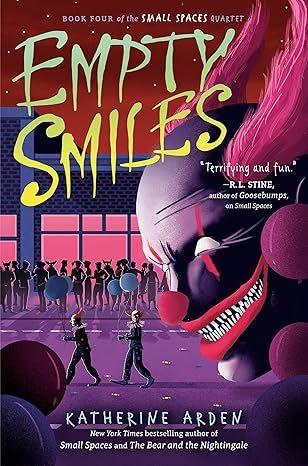
Empty Smiles (Small Spaces Quartet)
4.5
-
514
$8.81
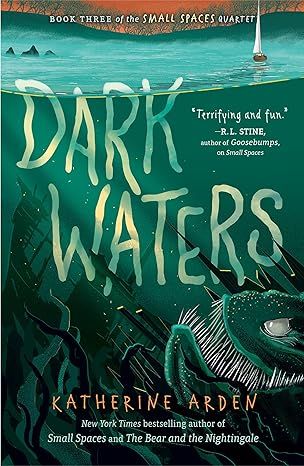
Dark Waters (Small Spaces Quartet)
4.5
-
702
$2.99

Dead Voices (Small Spaces Quartet)
4.6
-
1,279
$2.99

Small Spaces (Small Spaces Quartet)
4.6
-
2,480
$4.99
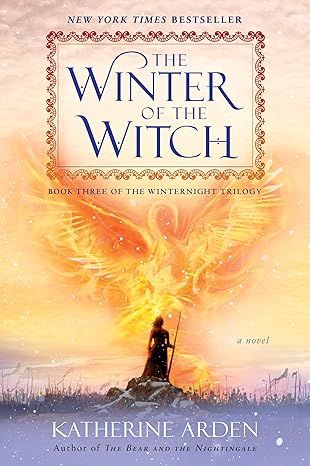
The Winter of The Witch
4.7
-
8,459
$12.95
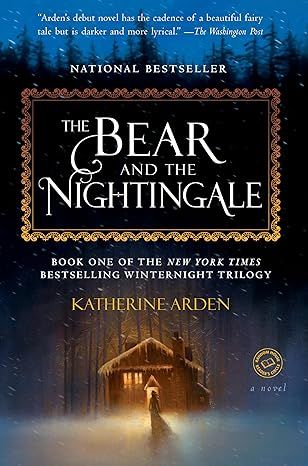
The Bear and the Nightingale: A Novel (Winternight Trilogy)
4.4
-
16,897
$10.39
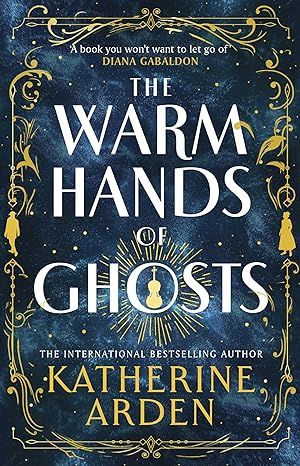
The Warm Hands of Ghosts
4.3
-
1,167
$13.99
Best Sellers
View all
The Tuscan Child
4.2
-
100,022
$8.39

The Thursday Murder Club: A Novel (A Thursday Murder Club Mystery)
4.3
-
155,575
$6.33

Sapiens: A Brief History of Humankind
4.6
-
140,302
$13.49

The Butterfly Garden (The Collector, 1)
4.3
-
88,556
$9.59

Things We Hide from the Light (Knockemout Series, 2)
4.4
-
94,890
$11.66

The Last Thing He Told Me: A Novel
4.3
-
154,085
$2.99

The Perfect Marriage: A Completely Gripping Psychological Suspense
4.3
-
143,196
$9.47

The Coworker
4.1
-
80,003
$13.48

First Lie Wins: A Novel (Random House Large Print)
4.3
-
54,062
$14.99

Mile High (Windy City Series Book 1)
4.4
-
59,745
$16.19

Layla
4.2
-
107,613
$8.99

The Locked Door
4.4
-
94,673
$8.53
